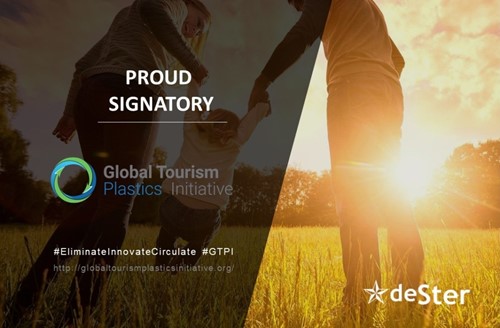deSter is proud to be a signatory of the Global Tourism Plastics Initiative led by the United Nations Environment Programme and the World Tourism Organization (UNWTO), in collaboration with the Ellen MacArthur Foundation.
As a signatory of the Global Tourism Plastics Initiative, we endorse the common vision to address the root causes of plastic pollution.
We commit to eliminate the plastic items we don’t need; innovate so all plastics we do need are designed to be safely reused, recycled, or composted; and circulate everything we use to keep it in the economy and out of the environment.

By 2025, deSter, a gategroup member, commits to:
- Making 100% of their plastic packaging reusable, recyclable or compostable by 2025.
- Introducing or expanding reuse and closed loop recycling models for consumer facing products/packaging.
- Delivering 5 pilots of reuse models for products or packaging by 2025
- Collaborating with others and investing in collection and segregation of recyclable and organic materials to help increase recycling and composting rates in practice
- Reporting publicly and annually on progress made towards these targets.
Developed within the framework of the Sustainable Tourism Programme of the One Planet network, a multi-stakeholder partnership to implement SDG 12 on Sustainable Consumption and Production, the Global Tourism Plastics Initiative is led by the United Nations Environment Programme and the World Tourism Organisation, in collaboration with the Ellen MacArthur Foundation. The Global Tourism Plastics Initiative acts as the tourism sector interface of the New Plastics Economy Global Commitment, which unites more than 450 businesses, governments, and other organisations behind a common vision and targets to address plastic waste and pollution at its source. As such, the Global Tourism Plastics Initiative will implement the New Plastics Economy vision, framework and definitions to mobilise the global tourism industry towards concerted significant action against plastic pollution.
The Global Tourism Plastics Initiative aims to stop plastic ending up as pollution while also reducing the amount of new plastic that needs to be produced. To realise this vision, tourism companies destinations commit to eliminate the plastic items they don’t need; innovate so all plastics they do need are designed to be safely reused, recycled, or composted; and circulate everything they use to keep it in the economy and out of the environment.
The Global Tourism Plastics Initiative requires tourism organisations to make a set of concrete and actionable commitments by 2025:
- Eliminate problematic or unnecessary plastic packaging and items by 2025;
Take action to move from single-use to reuse models or reusable alternatives by 2025; - Engage the value chain to move towards 100% of plastic packaging to be reusable, recyclable, or compostable;
- Take action to increase the amount of recycled content across all plastic packaging and items used;
- Commit to collaborate and invest to increase the recycling and composting rates for plastics;
- Report publicly and annually on progress made towards these targets.
By transitioning to circularity in the use of plastics, the tourism sector can make positive contributions like reducing landfill, pollution, natural resource depletion and greenhouse gas emissions; raising awareness of conservation among staff and guests to avoid single-use plastic products; influencing their suppliers to produce more sustainable alternatives to single-use plastic products; working with governments to improve local waste infrastructure and community facilities; and creating sustainable livelihoods and long-term community prosperity in harmony with nature.
By taking serious action in a coordinated and determined manner on plastic pollution, the tourism sector can help preserve and protect the places and wildlife that make destinations worth visiting.
About the Global Tourism Plastics Initiative
The Global Tourism Plastics Initiative is developed by the Sustainable Tourism Programme of the One Planet network, a multi-stakeholder partnership to implement SDG 12 on Sustainable Consumption and Production. The Global Tourism Plastics Initiative is led by the UN Environment Programme and the World Tourism Organisation, in collaboration with the Ellen MacArthur Foundation. The Global Tourism Plastic Initiative acts as the tourism interface of the New Plastics Economy Global Commitment. It endorses its common vision and is aligned with its commitments, definitions and framework.
https://www.oneplanetnetwork.org/sustainable-tourism/global-tourism-plastics-initiative
About the One Planet network Sustainable Tourism Programme
The One Planet Sustainable Tourism Programme has the overall objective to enhance the sustainable development impacts of the tourism sector by 2030, by developing, promoting and scaling up sustainable consumption and production practices that boost the efficient use of natural resources while producing less waste and addressing the challenges of climate change and biodiversity. The One Planet Sustainable Tourism Programme is led by the World Tourism Organization (UNWTO) with the Government of France (Ministry for the Ecological and Inclusive Transition) and the Government of Spain (Secretariat of State for Tourism) as co-leads. The Sustainable Tourism Programme is part of the One Planet network, a multi-stakeholder partnership to implement SDG 12 on Sustainable Consumption and Production.
About the United Nations Environment Programme
The United Nations Environment Programme is the leading global voice on the environment. It provides leadership and encourages partnership in caring for the environment by inspiring, informing and enabling nations and peoples to improve their quality of life without compromising that of future generations.
About the World Tourism Organisation
The World Tourism Organization (UNWTO) is the United Nations agency responsible for the promotion of responsible, sustainable and universally accessible tourism. As the leading international organization in the field of tourism, UNWTO promotes tourism as a driver of economic growth, inclusive development and environmental sustainability and offers leadership and support to the sector in advancing knowledge and tourism policies worldwide.
About the Ellen MacArthur Foundation
The Ellen MacArthur Foundation was launched in 2010 with the aim of accelerating the transition to the circular economy. Since its creation, the charity has emerged as a global thought leader, putting the circular economy on the agenda of decision-makers around the world. The charity’s work focuses on seven key areas: insight and analysis; business; institutions, governments, and cities; systemic initiatives; circular design; learning; and communications.
About the New Plastics Economy Global Commitment
The New Plastics Economy Global Commitment unites businesses, governments, and other organisations behind a common vision and targets to address plastic waste and pollution at its source. Signatories include companies representing 20% of all plastic packaging produced globally, as well as governments, NGOs, universities, industry associations, investors, and other organisations. The New Plastics Economy Global Commitment is led by the Ellen MacArthur Foundation, in collaboration with the UN Environment Programme.
https://www.newplasticseconomy.org/projects/global-commitment
